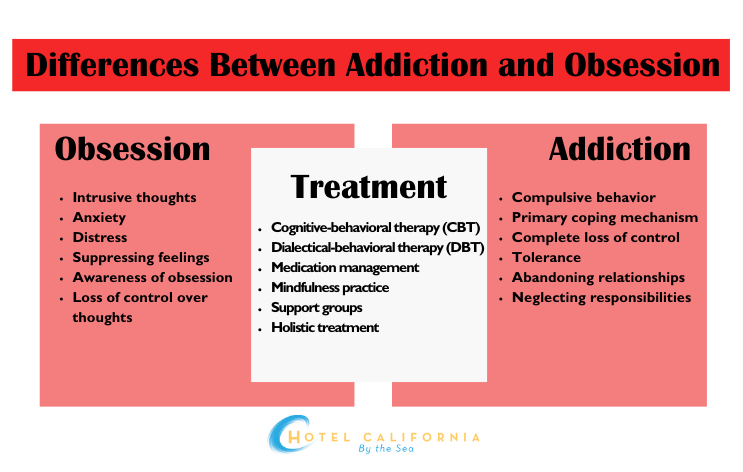What is the difference between Obsession vs Addiction?
Addiction and obsession are terms that can look the same, and are used interchangeably but are actually very different in both technical and practical terms. In many cases, they can occur simultaneously together making it very difficult for a person to overcome their obsession and addiction. People who have an addiction are often driven by the desire to escape their reality. People who have an obsession are often driven by fear of their reality. Recovery from either or both mental health behaviors can be difficult and should be treated separately in order to understand the root causes of both.

Gambling is an example of a behavior that can represent both an addiction as well as an obsession. Addictive behavior in gambling is when the person dreams about how he/she will spend the money they win and how they can benefit from these winnings. They are actively imagining the act of winning which can be enticing, exciting and consuming the majority of their thoughts and behaviors. The obsession part of this behavior is to gamble in the same place, on the same day of the week and with the same numbers. If the act of gambling is not done in this exact manner, the person believes there is no chance of winning despite evidence from past wins or losses. The most important part of this behavior is that the gambling must be done in a certain way every single time.
Someone with an addiction seeks to escape or leave their environment, while someone with an obsession seeks to control their environment. Despite being two different types of behaviors, addiction and obsession are often interconnected. For someone coping with an obsessive-compulsive disorder, it can be mentally exhausting. These people often turn to substances to self-medicate and provide short-term relief. Constantly self-medicating will eventually lead to repeated abuse and addiction. Social isolation that can be caused by having an obsessive disorder can also lead people to abuse substances. This is due to the shame and stigma they often feel about their behaviors knowing that it can be illogical in a sense.
What is an Addictive behavior?
Addiction is a mental health disorder in which a person engages in an activity or behavior over and over again despite resulting in repeated negative consequences. An addictive behavior occurs when a person does not feel satisfied unless they are using mind-altering substances to help them escape their reality. This may come in the form of drinking alcohol to relax or taking a prescription drug to help numb their emotional pain. This can also come in the form of a person continuously shopping and spending money they do not have for clothing to feel better about their appearance.
These types of behaviors are rooted in trying to escape from an undesirable place to someplace more desirable. This person is often daydreaming about their life with less stress or pain, both physically and emotionally. This person will tend to fantasize about their life through real-life experiences or imagined experiences which can lead to developing an addictive behavior.

What is an Obsessive behavior?
Obsession is a severe occupation with a particular idea or action in which a person compulsively engages in. An obsessive behavior consists of engaging in ritualistic routines that are incorporated into everyday life. Behaviors such as rechecking all the door locks several times even after they have already been checked or straightening up or tidying up things in neat and even rows. These types of behaviors are all rooted in fear, unwanted thoughts and fantasies.
These people fear that if they do not follow their specific routine, there will be negative consequences. This type of fear can be real or even imagined and can lead to the development of obsessive behavior and obsessive-compulsive disorder (OCD). Obsessive-compulsive disorder is one of the most common mental health conditions in America. It involves recurrent, unwanted thoughts or actions. The mental and emotional pain that comes from OCD can lead a person to self-medicate with drugs and alcohol, which can then lead to developing an addiction.
Check Your Insurance Coverage for FREE
Find out if your insurance covers addiction treatment in minutes. We accept most insurance!
Obsession vs Addiction
Obsession
- Obsession is generally fear-based and focuses on avoiding a particular or assumed negative outcome.
- Obsession can manifest in behaviors such as phobias, unwanted thoughts, fantasies or compulsions.
- People with obsessions often also have compulsions which are repeated behaviors that the person believes will deflect unwanted thoughts and urges.
- According to the DSM, obsessions and compulsions are time-consuming and can take up more than a few hours of the day.
- People who develop OCD fall into four different categories or behaviors: People who compulsively wash because they are afraid of contamination. People who repeatedly check things over and over again. People who are afraid they are not performing perfectly. People who are fixated on counting or assembling items in colors, numbers or a specific arrangement resulting in counting and repeating words.
- OCD can leave people feeling isolated from the rest of society.
- OCD can develop in the late teens and early twenties.
- Fear of germs, viruses, bacteria or getting sick.
- Obsession over good or bad numbers.
- Obsession with religious topics or thoughts, can lead to excessive praying.
- Fear of losing loved ones to illness or injury, can lead to obsessively checking up on loved ones.
Addiction
- Addiction is a chronic mental health disease characterized by a desire to change how you feel through behaviors or actions that can lead to negative consequences.
- Addiction stems from dependency, which has a physical origin in the brain. Dependency develops due to an increase in dopamine when you engage in pleasurable activities. This chemical dependency on dopamine is called an addiction.
- Addictive behaviors are often driven by the desire to feel or gain pleasure.
- It is most often associated with substance and alcohol use disorder.
- A person with an addiction is preoccupied with excessive time spent thinking about or planning to engage in such behaviors.
- A person with an addiction engages in actions or behaviors as a temporary fix to their emotional problems.
- A person with an addiction often has a loss of control over their behavior.
- A person with an addiction will continue to engage in the behavior despite adverse consequences.
- Addiction can lead to changes in brain function and alter how the brain registers pleasure and processes important information.
- Types of addictive behaviors include increased frequency of drug use, increased quantity of drug use, and increased drive to overcome any setbacks to obtain substance.
Reach out to Hotel California by the Sea
We specialize in treating addiction and other co-occurring disorders, such as PTSD. Our Admissions specialists are available to walk you through the best options for treating your addiction.
Treatment for Substance Use Disorder
Obsession and addiction are two different types of behaviors that can both lead to the development of a substance use disorder. Obsession stems from feelings of fear, while addiction stems from feelings of desire and escape. The combination of the two mental health conditions can lead to severe conditions of drug and alcohol misuse. Hotel California by the Sea can help clients treat their behavioral health disorders by getting to the condition’s root cause and treating all aspects of the disease.
We provide medical drug detox, inpatient residential treatment, partial hospitalization program and intensive outpatient program. In addition, we also utilize intensive treatment methods such as CBT, DBT, group therapy and family therapy. With the help of our support and resources, clients in all stages of recovery can achieve sobriety. Hotel California by the Sea is completely dedicated to helping our clients overcome their addiction.
References:
https://www.addictions.com/blog/addiction-vs-obsession-whats-the-difference
https://www.addictioncenter.com/dual-diagnosis/obsessive-compulsive-disorder
https://overcomewithus.com/addiction/are-addiction-and-obsession-the-same-thing
https://www.pyramid-healthcare.com/addictive-vs-obsessive-whats-the-difference/
